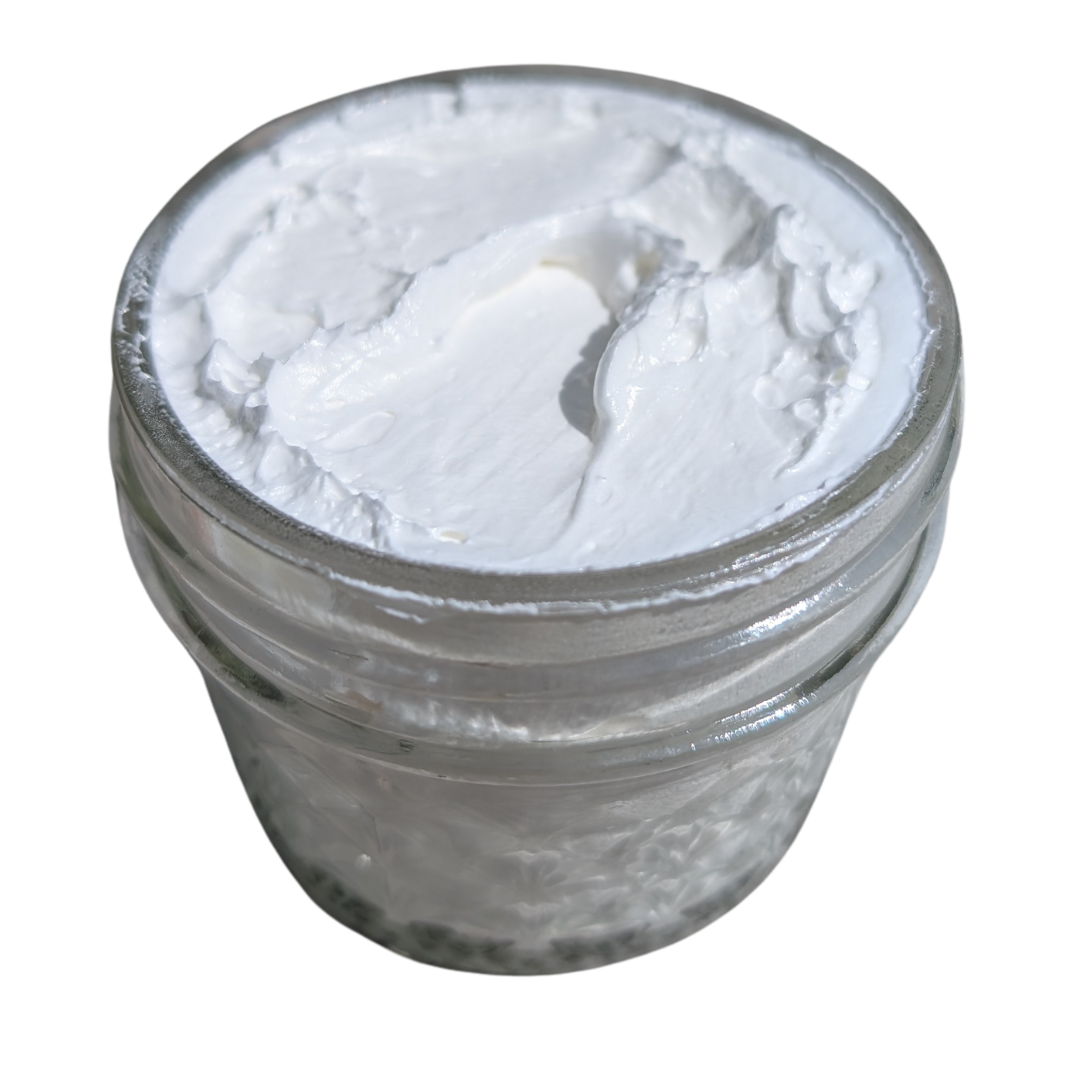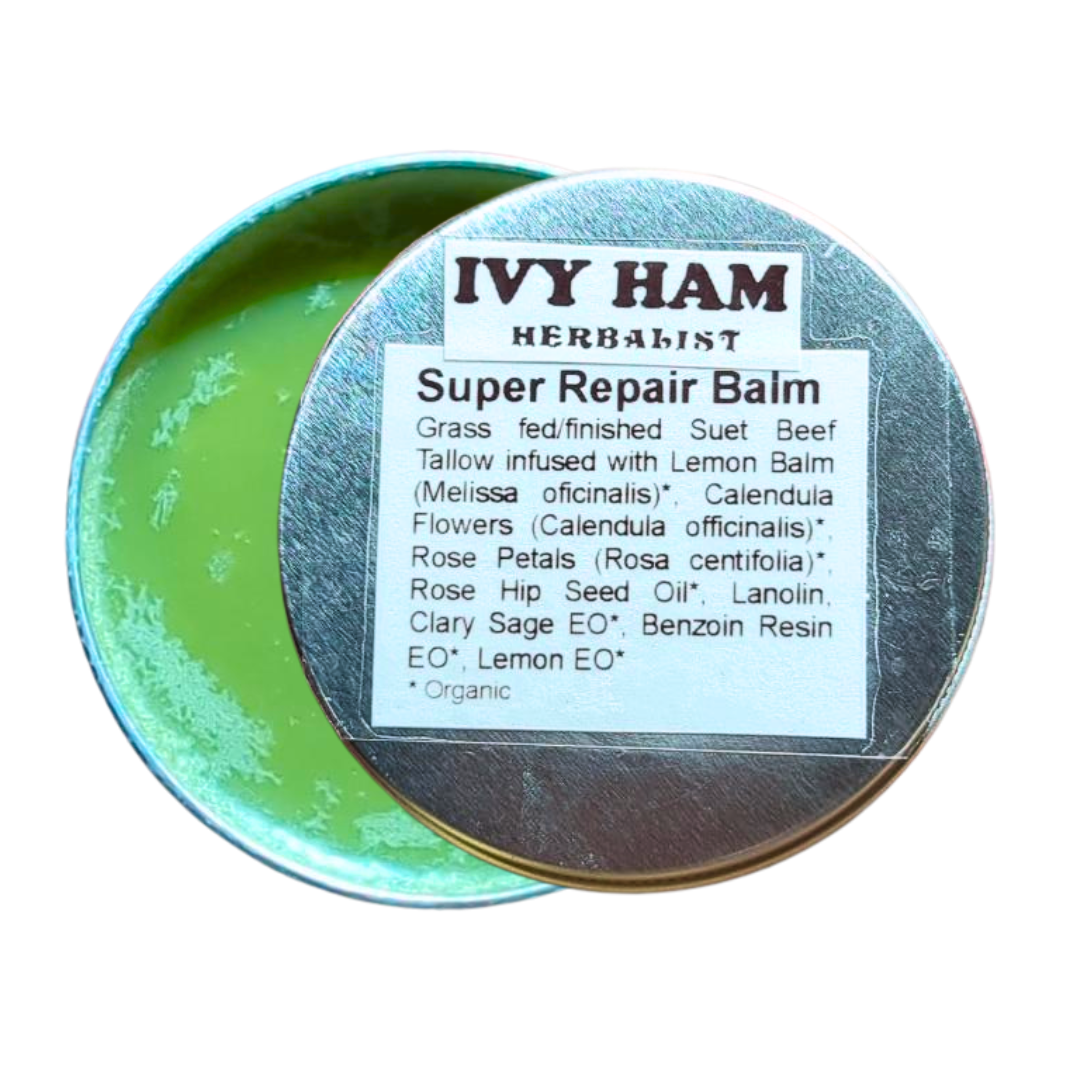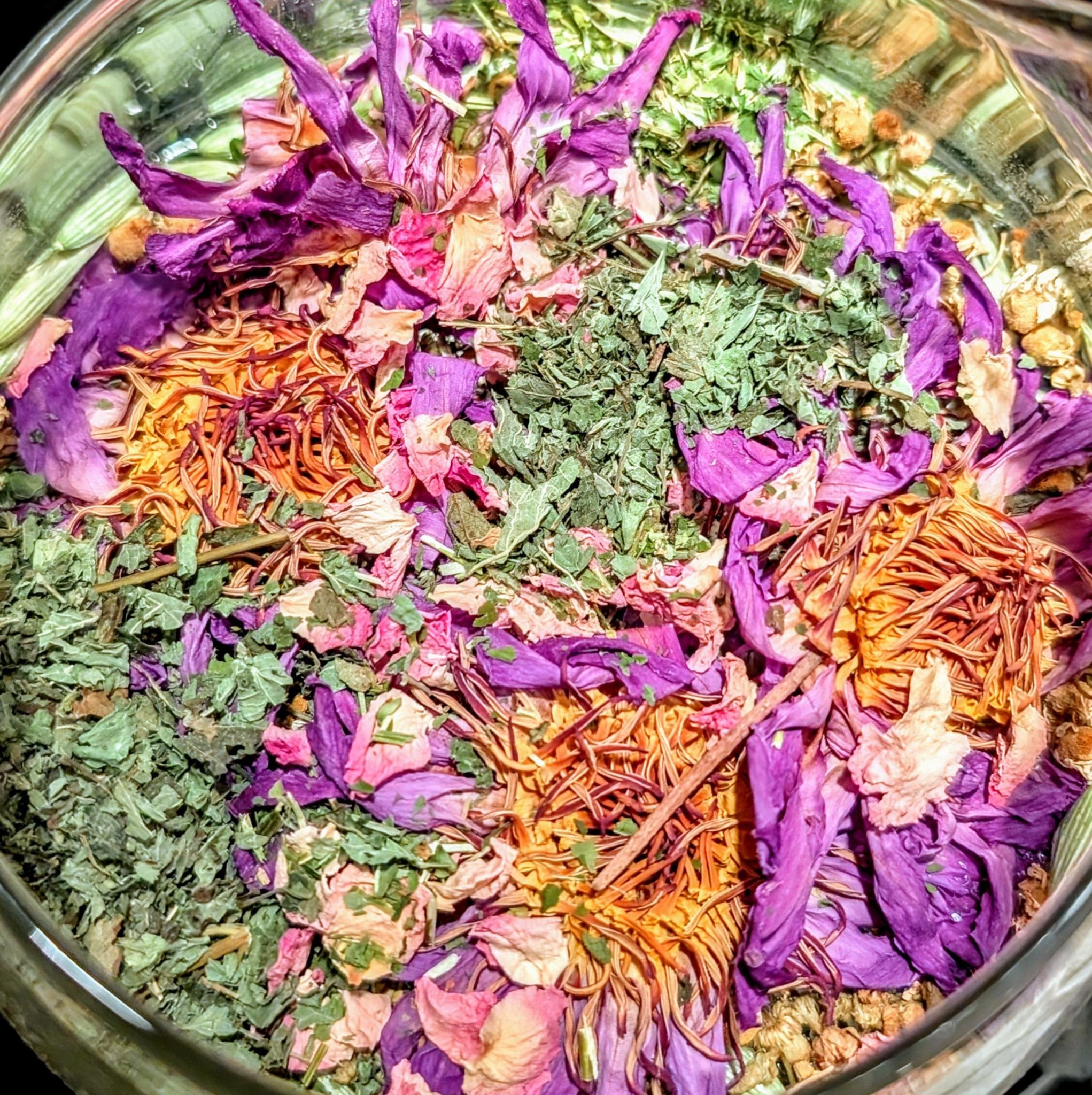Herbs for Seasonal Allergies
Seasonal allergies can be more than a mere inconvenience—they often disrupt daily life and overall well-being. While over-the-counter medications provide relief, they also have side effects, leading many to seek natural alternatives to support their immune and respiratory health. Below, we explore evidence-backed herbs and supplements known for reducing allergy symptoms. A complete list of studies and references is included at the bottom of this article. As always, consult a healthcare professional before making significant changes to your wellness routine.
Understanding Seasonal Allergies
Seasonal allergies (commonly called allergic rhinitis or hay fever) occur when the immune system becomes hypervigilant, overreacting to harmless particles such as pollen proteins. Ironically, this heightened immune response often occurs when the immune system is weakened, triggering it to attack any foreign substance—even those that pose no threat. Strengthening and supporting your immune system’s overall terrain can reduce its reactivity, making your body less prone to allergy symptoms like sneezing, itching, runny nose, and nasal congestion.
Stinging Nettles (Urtica dioica)
Herbs and Mushrooms for Allergy Relief
Butterbur (Petasites hybridus)
Butterbur root extract is a powerful herbal antihistamine and is one of my favorites for clients who suffer from seasonal allergies. Clinical studies have shown that butterbur works just as effectively as cetirizine (Zyrtec), a common pharmaceutical antihistamine, in reducing allergy symptoms. Impressively, butterbur achieves these results without causing the drowsiness often associated with conventional antihistamines. Butterbur’s primary active compounds, petasin and isopetasin, inhibit leukotriene and histamine release—two major contributors to allergic inflammation. When choosing butterbur supplements, ensure they're labeled as "PA-free" (free of pyrrolizidine alkaloids) for safety. Butterbur can interact with anticholinergic medications, so consulting a healthcare professional is advised.
Freeze-Dried Stinging Nettles (Urtica dioica)
Stinging nettles have a long-standing reputation for easing seasonal allergies. Their natural antihistamine compounds, particularly bioactive amines, can reduce histamine release, thus alleviating allergy symptoms. I see them recommended all the time on social media for allergies, but often without the caveat that they MUST be freeze dried or fresh to work as an antihistamine. Any form of drying or heat processing will denature the sensitive antihistamine constituents in this plant. If you are lucky enough to have access to fresh nettles, you can crush them to denature the stinging compound and make them safe to eat. They make a nice pesto. Nettles are generally safe, even during pregnancy and lactation, and provide essential minerals that further support overall immune health.
Mullein (Verbascum thapsus)
Mullein leaves contain soothing mucilage, flavonoids (such as acubin), and saponins, while the flowers are rich in volatile oils. These compounds work synergistically—mucilage soothes irritated respiratory tissues, flavonoids reduce inflammation, and saponins loosen mucus, making it easier to expel. Taken regularly as a tea or tincture, mullein can ease respiratory discomfort associated with seasonal allergies. Make sure to strain your tea very well as the tiny hairs found covering this plant can be irritating.
Reishi Mushroom (Ganoderma lucidum)
Reishi mushrooms have been prized for centuries in herbal traditions for their immune-balancing properties. Rich in polysaccharides and triterpenes (like ganoderic acids), reishi mushrooms gently modulate immune reactions, helping to calm overactive immune responses that characterize allergies. These constituents also provide anti-inflammatory benefits, helping to reduce respiratory symptoms. Individuals sensitive to molds should consult a professional before using reishi. Be aware that this would be a more slow-acting option for spring allergies. I get my Organic Reishi extract powder from Mountain Rose Herbs (affiliate link).
Vitamins, Minerals, and Other Supplements
Quercetin
Quercetin, a flavonoid found abundantly in apples, onions, berries, and grapes, can stabilize mast cells, preventing excessive histamine release. Its antioxidant properties further help to alleviate inflammation and respiratory symptoms linked with allergies.
Vitamin C
Vitamin C provides well-documented immune support and has antioxidant properties that decrease inflammatory responses. Regular vitamin C supplementation can improve respiratory function and reduce severity of allergic symptoms.
Vitamin D
Vitamin D plays a critical role in immune regulation, and deficiency has been linked to higher rates of allergic disease. Maintaining adequate vitamin D levels helps support a balanced immune response, potentially preventing hyperreactivity to allergens.
Raw Honey
Raw honey, particularly locally sourced and preferably stored in glass containers, is commonly used to gently desensitize the immune system to local pollens. Small, regular intake may gradually reduce allergic responses over time, though individual responses can vary, and some people might initially experience increased symptoms.
Spirulina
Spirulina, a nutrient-dense blue-green algae, has demonstrated efficacy in reducing allergic rhinitis symptoms due to its immune-modulating and anti-inflammatory properties. Regular intake can support balanced immune function during allergy season.
Zinc
Zinc is fundamental to immune cell function, and deficiency correlates with increased risk of developing allergies. Supplementing with zinc can help enhance immune resilience, reducing the likelihood and severity of allergic episodes.
Magnesium
Magnesium supports hundreds of biochemical reactions, including those critical to respiratory health. It may ease bronchoconstriction (narrowing of the airways) and lower histamine production, helping manage allergic reactions and respiratory symptoms.
N-Acetyl Cysteine (NAC)
NAC is a precursor to glutathione, the body’s master antioxidant. It thins mucus in the respiratory tract and lowers inflammation, making breathing easier during allergy season. Regular supplementation can help alleviate symptoms associated with allergic respiratory inflammation.
Tips for Safe Use
Always consult a qualified healthcare provider or herbalist, especially if you have existing conditions or take medications. Choose high-quality, standardized supplements for best results, and introduce new herbs or supplements gradually to monitor how your body reacts. Some herbs and supplements may interact with existing health conditions and RX medications, so be cautious and do your own research before starting anything new.
Anti-Inflammatory Diet for Allergy Relief
Diet plays a significant yet often overlooked role in managing seasonal allergies. Eating an anti-inflammatory diet can indirectly—but powerfully—reduce the severity and frequency of allergy symptoms by lowering your body’s overall inflammatory burden. Seasonal allergies are essentially an inflammatory reaction, triggered when your immune system overreacts to otherwise harmless particles like pollen. If your body's baseline inflammation is high due to dietary factors—such as processed foods, sugar, refined carbohydrates, and industrial seed oils—your immune system is more likely to respond aggressively, even to minor irritants.
Focusing on anti-inflammatory foods helps reduce systemic inflammation, calming immune hyperreactivity. Prioritize foods rich in antioxidants, healthy fats, and micronutrients—such as colorful vegetables, berries, grass-fed meats, wild-caught fatty fish rich in omega-3s (like salmon and sardines), and healthy fats like olive oil, coconut oil, and butter from grass-fed animals. Herbs and spices like turmeric, ginger, and rosemary also offer powerful anti-inflammatory benefits.
Incorporating these dietary changes creates a supportive environment, enabling your immune system to respond more appropriately to allergens, and ultimately helping you experience fewer allergy symptoms and greater comfort during allergy season.
Final Thoughts
Seasonal allergies don't have to control your life. Combining immune-supportive herbs, key nutrients, and proactive lifestyle strategies can significantly reduce your symptoms and enhance overall well-being. Whether exploring butterbur’s remarkable antihistamine action, nettle’s mineral-rich benefits, or immune-boosting vitamins, tailor your approach alongside a healthcare professional to achieve the best results.
-
Schapowal A; Petasites Study Group. Randomised controlled trial of butterbur and cetirizine for treating seasonal allergic rhinitis. BMJ. 2002 Jan 19;324(7330):144-6. doi: 10.1136/bmj.324.7330.144. PMID: 11799030; PMCID: PMC64514.
Maywald M, Rink L. Zinc Deficiency and Zinc Supplementation in Allergic Diseases. Biomolecules. 2024 Jul 19;14(7):863. doi: 10.3390/biom14070863. PMID: 39062576; PMCID: PMC11274920.
Gontijo-Amaral C, Ribeiro MA, Gontijo LS, Condino-Neto A, Ribeiro JD. Oral magnesium supplementation in asthmatic children: a double-blind randomized placebo-controlled trial. Eur J Clin Nutr. 2007 Jan;61(1):54-60. doi: 10.1038/sj.ejcn.1602475. Epub 2006 Jun 21. PMID: 16788707.
Chyrek-Borowska S, Obrzut D, Hofman J. The relation between magnesium, blood histamine level and eosinophilia in the acute stage of the allergic reactions in humans. Arch Immunol Ther Exp (Warsz). 1978;26(1-6):709-12. PMID: 749826.
Lee PH, Hong J, Jang AS. N-acetylcysteine decreases airway inflammation and responsiveness in asthma by modulating claudin 18 expression. Korean J Intern Med. 2020 Sep;35(5):1229-1237. doi: 10.3904/kjim.2019.105. Epub 2020 Feb 28. PMID: 32098455; PMCID: PMC7487305.
Mlcek J, Jurikova T, Skrovankova S, Sochor J. Quercetin and Its Anti-Allergic Immune Response. Molecules. 2016 May 12;21(5):623. doi: 10.3390/molecules21050623. PMID: 27187333; PMCID: PMC6273625.
Ghalibaf MHE, Kianian F, Beigoli S, Behrouz S, Marefati N, Boskabady M, Boskabady MH. The effects of vitamin C on respiratory, allergic and immunological diseases: an experimental and clinical-based review. Inflammopharmacology. 2023 Apr;31(2):653-672. doi: 10.1007/s10787-023-01169-1. Epub 2023 Feb 27. PMID: 36849854; PMCID: PMC9970132.
Mirzakhani H, Al-Garawi A, Weiss ST, Litonjua AA. Vitamin D and the development of allergic disease: how important is it? Clin Exp Allergy. 2015 Jan;45(1):114-25. doi: 10.1111/cea.12430. PMID: 25307157; PMCID: PMC4369152.
Cingi C, Conk-Dalay M, Cakli H, Bal C. The effects of spirulina on allergic rhinitis. Eur Arch Otorhinolaryngol. 2008 Oct;265(10):1219-23. doi: 10.1007/s00405-008-0642-8. Epub 2008 Mar 15. PMID: 18343939.









